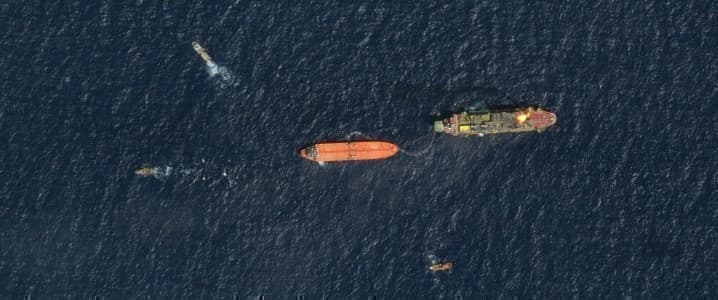The Russian invasion of Ukraine has not only led to an increase in the shipment of sanctioned crude oil and petroleum products by a shadow fleet, but it is also escalating overall maritime security risks. A report by consultancy Vortexa indicates a renewed increase in Greek-owned vessels transporting sanctioned Russian crudes and products. Simultaneously, tanker experts are warning of a Wild West situation in maritime traffic, as a shadow fleet of uninsured tankers is sailing in international waters. Reuters reports that maritime security is under threat, as uninsured or shadow vessels are running aground or experiencing near collisions worldwide. At present, an oil tanker has run aground offshore eastern China, while a collision between tankers has been averted near Cuba. Reuters analysis shows that a shadow fleet of hundreds of extra ships is sailing the seas, partly already linked to the opaque Iranian oil exports but now being supported by the demand for Russian energy shipping. Statements made to Reuters by Eric Hanell, CEO of tanker operator Stena Bulk, indicate that “the risk of having an accident is definitely going up.” The risks of collisions by unreliable vessels due to a lack of certification or engine maintenance have increased as leading insurers and services companies are no longer wanting to work with ships carrying crude oil and petroleum products coming from Russia, Iran, and Venezuela. Reuters analysis based on ship-tracking information and Lloyd’s List Intelligence data on vessel incidents shows that eight groundings, collisions, or near misses involving tankers carrying sanctioned products were reported in 2022, which is the same as the whole period of 1999-2021.
Related: Goldman Sachs Sees Commodities Supercycle On The Horizon
According to Reuters, the shadow fleet at present entails between 400-600 vessels worldwide, which is around 20% of the total tanker fleet globally. Trafigura's Andrea Olivi, head of wet freight, even states that, according to them, it is now at 650 units. The main risks at present are related to ship-to-ship transfers, which are widely used by the shadow fleet at present. Claire Jungman of US advocacy group United Against Nuclear Iran (UANI) reports that Iran's shadow fleet has increased from 70 in November 2022 to 300 vessels right now. The latter could be correct, considering Iran's increased oil exports in recent months. Vessel data provider VesselsValue indicated that 774 tankers out of 2,296 worldwide are 15 years or older.
According to a report by independent consultancy Vortexa, Greek ships dominate the transportation of Russian crude oil. Vortexa suggests that Greek ship owners have taken advantage of the ban on Russian oil exports, which came into effect on December 5, 2022. Although the current practice is not illegal, tanker owners can transport Russian crude oil if they agree to a price cap. Greek owners reduced their involvement in the wake of the December 5 ban, but their participation has almost returned to pre-ban levels.

However, pressure is mounting on Greek owners, as Ukraine is openly pressuring well-known Greek shipping companies like TMS Tankers, Dynacom Tankers, Minerva Marine, Thenamaris, and Delta Tankers. These companies have even been added to the War and Sanctions website created by the Ukrainian government. On Monday, S&P Global Market Intelligence identified 1,900 vessels at risk of Russian sanctions, with the majority being Greek-owned. Since 2023, over 150 of these high-risk vessels have made port calls in Russia, the majority of which are also Greek-owned. Furthermore, Greek vessels are overwhelmingly involved in Ship-to-Ship operations in the Peloponnese region.

By Cyril Widdershoven for Oilprice.com
More Top Reads From Oilprice.com:
- Standard Chartered Blames Gamma Hedging For Overdue Oil Selloff
- Oil Prices Near $75 As Russia Extends Output Cut Through June
- Bank Turmoil Could Undermine The Effect Of Biden’s Clean Energy Bill


















